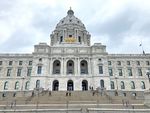2022 SUPPLEMENTAL BUDGET: CLIMATE ADAPTATION AND MITIGATION
←
→
Page content transcription
If your browser does not render page correctly, please read the page content below
BUDGET TO MOVE Drought
MINNESOTA FORWARD
Bonding
Climate
2022 SUPPLEMENTAL BUDGET:
CLIMATE ADAPTATION AND MITIGATION
Governor Walz and Lt. Governor Peggy Flanagan’s Budget to Move Minnesota Forward includes
$81.5 million in investments for DNR‑managed public lands, facilities and infrastructure to reduce
carbon in the atmosphere and adapt to current and future climate change impacts.
You can read more on the climate adaptation and mitigation investments below.
CLIMATE ADAPTATION
AND MITIGATION
Climate Adaptation for Natural Lands and Waters
($42 million)
Climate change is already impacting our natural
lands and waters as well as Minnesotans’ ability
to access and enjoy the benefits they provide.
The budget includes a $42 million General Fund
investment to help ensure the continued health
of, and public access to, natural lands and waters
in the face of current and future climate change.
The funding will address the following:
• Rehabilitating public water accesses to repair
climate‑driven flood and ice damage and to
reconfigure the sites to ensure they are still
functional in the face of future climate change.
• Restoring plant communities in state parks to
maintain the beauty of these landscapes for
current and future visitors to enjoy.
• Replacing culverts and restoring streams to
• Modernizing and adapting fish hatcheries so they enhance the resiliency of Minnesota fisheries,
are resilient to climate impacts and can support waterfowl production wetlands and lakes to
healthy, climate‑adapted fisheries. climate change impacts.
• Upgrading state park roads and trails to withstand
more intense rainfall if they are to remain useable
into the future.
continued
AGY_0137_22Restoring Grasslands and Wetlands on Wildlife Acquisition of Public Lands ($24 million)
Management Areas for Carbon Capture Public lands capture and store carbon; and will
and Resiliency ($10 million) provide increased climate resiliency by increasing
Grasslands and wetlands will capture and store water storage and thereby reducing flooding risk;
increased carbon following enhancement or and provide habitat for wildlife, pollinators, and
restoration. For grasslands, carbon accumulates in other species which will also help plant and animal
the soil very quickly after enhancement and stays communities adapt to future climate conditions.
there unless the soils are heavily disturbed. Over In addition to providing climate and conservation
time, restored wetlands also become a carbon “sink.” benefits, public lands support outdoor recreation.
Grassland and wetland enhancement and restoration Time outdoors strengthens family bonds and
also advance climate resiliency by increasing water promotes health and wellness, and access to outdoor
storage and groundwater and aquifer recharge, experiences on public lands has been particularly
thereby reducing invaluable for children and families during the
flooding potential during COVID‑19 pandemic.
extreme weather events.
This budget includes a $24 million General Fund
The budget includes a investment to acquire new public lands to support
$10 million General Fund recreation and conservation, with the goal of
investment to enhance decreasing the state’s net greenhouse gas emissions.
grasslands and restore
wetlands on existing
state‑owned wildlife
management areas to
sequester increased
carbon and enhance
climate resiliency, while
also providing better
pollinator and wildlife
habitat.
Enhanced Forest Management Assistance to Private
Woodland Owners ($5.5 million)
Climate change and forest pests are creating greater
need for proactive forest planning and management
of private woodlands. The DNR provides forest
management assistance to woodland owners,
who collectively own 6.8 million acres (49%) of
Minnesota’s forests. Assisting woodland owners to
sustainably manage their forest is key to increasing
carbon capture and storage while assuring healthy
forests in the face of climate change.
This budget includes a $5.5 million General Fund
investment to meet the increased demand for
planning assistance and cost‑share funding to assist
private woodland owners whose lands are powerful
resources for climate mitigation and adaptation.Ensure Aggregate Mapping for Local Governments Public Safety Response ($1.73 million)
($300,000) Address deficiencies in the Enforcement Division’s
Invest to maintain staff to create aggregate budget due to the costs of public safety efforts.
resource maps for use by local governments.
Throughout the 2022 legislative session, go to the
DNR website for updates on this climate adaptation
and mitigation proposal as well as investments in DNR’s
work on drought relief and local jobs and projects.
“Preserving our environment and mitigating the effects
of climate change creates more resilient communities
today and protects our state’s natural resources and
maintains access for the generations of tomorrow.”
—DNR Commissioner Sarah Strommen
An Equal Opportunity Employer | mndnr.gov | ©2022, Minnesota DNRYou can also read























































